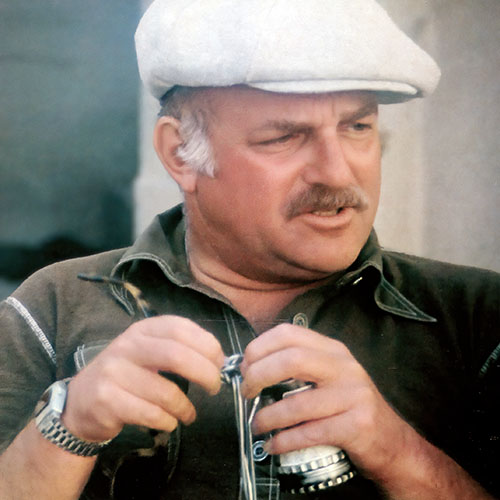Penthouse talks with the “L.A. punk” who turned animal rights into a celebrity craze.
Dan Matthews: The PETA Principal
In a nation boasting about its last four decades of political and social activism, there have been many likely and unlikely symbols and heroes. Dan Mathews qualifies in the latter category. Even his cause is unlikely, although it is a tribute to his imagination and leadership that it has become mainstream and is taken seriously. Unlike civil rights, opposition to the war in Vietnam, women’s rights, and gay rights, People for the Ethical Treatment of Animals is not about people. PETA is a half-million members strong — many from MTV’s must — invite list and audience. The organization often speaks with one voice, that of Dan Mathews — dramatic, often whimsical, always hip and cool.
Mathews is a 30-year-old grown-up punk, model, and former actor, a gay Southern Californian with the ability to attract and ingratiate himself with the rich and famous, and take advantage of their fame and social volunteerism. He is a master media manipulator and strategist, seizing the tabloid moment and extending it beyond 15 minutes. But he’s more than that.
Before Mathews joined PETA in 1985 as a $10,400-a-year receptionist, the only thing America knew about the plight of animals was a grainy, black-and-white photo in the back of popular magazines — usually donated by some advertising council doing voluntary work for causes without a budget — of a tortured beaver snagged in a hunter’s trap. So sweet, so sad, but it wasn’t Bambi. Time to move on to the next page. The media-savvy side of Mathews said “This ain’t working,” and the imaginative side found slicker ways to reach people. Thus began Dan Mathews’s cultivation of celebrities and the media. He does more than party with the dozens of celebrities who have become his friends, although he does a lot of that. He also puts them to work, always aware of their ability to attract attention and publicity — an ability that is almost as great as their desire for the limelight. Dan’s A-list of PETA pals and partisans would fill a mid-size arena; it includes Paul McCartney, Kim Basinger, Alec Baldwin, Mary Tyler Moore, Kirstie Alley, k. d. lang, Chrissie Hynde, the B-52s, Naomi Campbell, Christy Turlington, and, crossing the generation gap, Bea Arthur.
But Mathews is probably prouder of his A-list of enemies, who are mostly the lords and ladies of high fashion, including Bob Mackie, Oscar de la Renta, Karl Lagerfeld, the top corporate officers at the Gillette Company (one of the few major companies still using animals in product tests), animal-testing centers, and slaughterhouses, as well as Ronald McDonald and all who wear fur.
What made Dan Mathews successful in bringing PETA to the forefront of public consciousness was a talent that made its target audience perceive themselves as cool, correct, and courageous to want to save the lives of animals. It comes from one of Mathews’s insights into human nature: People will do little for others unless it makes them feel good. Feeling good includes being hip and cool and walking in the shadows of celebrities. So when Dan gets stars to demonstrate inside the offices of chic Parisian and New York designers who use fur, or supermodels Naomi Campbell and Christy Turlington to pose in the nude for PETA campaign posters, how can the wannabe-cools refuse to climb on the bandwagon?
This is not the activism of a sixties CORE sit-in at a Selma lunch counter, or a nineties Act-Up confrontation, leaving the coffin and body of an AIDS victim in front of the White House. This is genteel activism in which protagonist and antagonist enjoy the same music and films, and in the combat nobody is going to get bloodied.
But if one or two PETA members get carted off to the county lockup, be damned certain that if bail money is not there in an hour or so, they will be sharing overnight cells with muggers, junkies, or worse. It is activism for Generation X. If cool folks like Pearl Jam are aboard, can we miss the train for animal rights and still remain cool? And do we shun shellfish for other than dietary considerations because Mary Tyler Moore is willing to purchase a transcontinental airline ticket for a homeless lobster confined to a California restaurant’s tank? In a nutshell, PETA’s activism is cool, fashionable, and stamped with MTV’s seal of political correctness.
By saying all of the above, do we trivialize Dan Mathews, PETA, and animal rights? Do we stop testing for cancer and AIDS cures because PETA likes mice and hamsters and raises ethical questions about their slaughter for science? Must we freeze our winter butts off because Naomi Campbell shows her tits and ass to save chinchillas — alongside sickening pictures of animals caught in traps? And what about all the serious issues related to the sacrifice of animals to save humans? Penthouse thought our readers would be interested to learn the answers to these and other questions about PETA and the animal-rights movement, removing its curtain of glitz and pageantry.
Dan Mathews has been a personal friend of mine for three or four years. Knowing that Dan is anything but media shy, I sensed he’d be thrilled to talk to our millions of readers. The problem was catching up with him between flights across the country or overseas to spread the PETA gospel. I finally got him to sit down in a crowded airport restaurant. Dan is as charismatic as any celebrity member of PETA: six foot five, slim, with a model and actor’s good looks, and a warmth and desire to please his friends and audiences. Out of respect for our friendship, I ordered the vegetable special. As the following will reveal, Dan’s comments, always forceful and articulate — and more interesting than our meal-stripped the patina of hip and cool from the animal-rights movement and revealed a bit of its heart and soul.
“Our movement has no hidden agenda. We take the animal’s side in every debate.”
What is PETA’s goal?
To prompt people to reevaluate their relationship with animals. We grew up in a world where we were taught that animals are not much more than hamburgers and handbags, unless they happened to be the family dog. There is a hideous, violent, hidden world out there in which animals live behind the closed, locked doors of labs, slaughterhouses, and fur farms. Our job is to unlock these doors and let everybody see the carnage, and then make up their own minds if they really want to support these industries.
With most social movements there is usually a political connection; i.e., if the liberals love it, the conservatives hate it. But PETA seems to be apolitical.
It’s not about politics but personal development, and I think it’s very exciting why the cause is becoming so big globally. It’s not a movement defined by your politics. It is not defined by whether you’re liberal, conservative, male, female, straight, gay, black, white, old, or young, but by your own personal recognition of animals as neighbors. By that I mean neighbors and not play-things, lab tools, food, and ways to line our pockets. Young people have an easier time understanding this, and that is why many of our campaigns are directed at them.
Is it realistic, for example, to say that because we love animals we should close down those thousands of McDonald’s and Burger Kings and fire the help?
Well, I hope they just change and make veggie burgers. Look, PETA’s not about taking away people’s livelihoods. We’re encouraging these companies to diversify. There was a time in this country’s history when activists lobbied against child labor, and the response was that it was the cheapest labor and businesses would collapse. Guess what? They survived. No different than when the South learned the hard way they could develop a healthy economy without slavery. It’s the same with furriers. They can and are diversifying, selling fake fur and other kinds of outerwear, among other economic alternatives.
Not to beat a dead horse — oops…
It’s okay. Actually, it’s one of my favorite expressions. What?
What about those billions of burgers eaten in this country? It seems stopping people from eating meat is going to be a tad more difficult than getting women to give up their furs.
Oh, vegetarianism is much closer to my heart than fur. But we have to be realistic and practical. PETA has to look at what issues society can cotton to the easiest. It is easier for people to look and recognize the needless cruelty behind a fur coat than it is behind a hamburger. Fur is a first step in the progression of awareness of animal rights. Ricki Lake is an example. She ate meat before participating in our raid on fur designer Karl Lagerfeld’s office. Since spending the night in jail, she’s not touched a piece of red meat or chicken; she’s working on fish now. The point being, once you recognize the cruelty to animals in one area, it’s easy to connect the dots to the other areas.
Aren’t you being a bit disingenuous? It’s easy to get an 18-year-old rock-n-roller to say, “Yeah, I ain’t buying no $20,000 ermine coat,” but what about a two-buck Big Mac?
Look, we’re a movement fueled by the media, and they haven’t latched on to that as much yet. But we are focusing more on meat, so watch out!
On a small but telling level, the media latched on to it when Chrissie Hynde of the Pretenders said she’d like to bomb McDonald’s or when k. d. lang did our “Meat Stinks” commercial. We’re hoping to do a very exciting “veg” campaign with Madonna. Fur is only the very first step.
We have no hidden agenda; we take the animal’s side in every debate. We’re not unaware that we’re going against the grain of tradition, but now is a time in history where there’s a shift. It’s a generational shift to a large degree, but it’s a shift nonetheless, where people are reexamining relationships with animals and changing their lifestyles.
So the next time we see a rat in a trap, we should feel sympathetic?
It’s about basic respect and common decency. America is an apathetic country; people care about themselves and sometimes about their family and friends. So to get them to think about a rat is difficult, but I think we can do it. Look, if you can care about a rat, you can cam about everybody else in between.
Let’s get to PETA’s greatest and most controversial battle — opposition to animal experimentation, even if it can save human lives. How do you explain that?
First, put it all in perspective. Animal rights is also about human life. Many of the diseases for which scientists mutilate animals could be prevented if people didn’t eat animals in the first place. We’re talking heart disease, stroke, and many forms of cancer. Animals are caught in a vicious circle. So many young people are going veg because they’ve buried parents and relatives who didn’t learn until they were 60 what meat had been doing to them. The proof is overwhelming … and an important way they can avoid that fate is by not stuffing themselves full of dead animals.
People often have an irresponsible attitude toward their health. They do harmful things to themselves and then expect a doctor to come and clean up the mess. But often they learn there is no magic bullet. There is too much blind faith in elusive cures, and not enough in prevention.
“Mathew is passionate about the causes of heart disease and cancer: ‘People can avoid that fate… by not stuffing themselves full of dead animals.’”
What do you say to AIDS victims who are waiting for a cure that might be found by experimenting on animals?
Two of my best friends are dying of AIDS and we often talk about the wasteful diversion of funds to costly and cruel animal experiments. Everything of importance we’ve learned about AIDS has come through clinical studies of patients and epidemiological studies of the communities most affected. We didn’t learn AIDS was transmitted through anal sex by watching monkeys butt-fuck.
In the early days of AIDS research, weren’t animal studies important?
The government’s first response to AIDS was to overdose rats on poppers [amyl nitrate] because of the drug’s association with gays, while gay doctors in New York, San Francisco, and Los Angeles were desperate for clinical research funds. AIDS was allowed to spread for half a decade before patient studies were given proper attention, and it’s disgusting.
C. Everett Koop, who I sometimes admire and sometimes don’t, said that he does not believe there will ever be a cure for Al OS and that money is better spent on prevention and patient care. Animal research benefits researchers, not patients.
But AIDS patients and the gay community begged us to kill animals and test A.Z T Are you saying forget about them?
Of course not. The reality is that AIDS patients actually demanded that the government circumvent the endless “show and tell” animal tests and release the drug to those it was developed for. Yet A.Z.T. did not benefit AIDS patients as much as it did the pharmaceutical companies.
Let’s forget the big drug companies and turn the clock back to the Middle Ages. There weren’t any corporate villains then, but there was bubonic plague. Would you have said to leave the rats in peace, forget about a cure, and let hundreds of thousands die until disease runs its course?
I’m glad you brought this up, because it has a bearing on arguments today about animal experimentation. Bubonic plague was not cured through animal experimentation but through sanitation and developing sewage systems. It was through education and prevention, and no magic bullet, that the disease was halted. That is how most diseases have to be dealt with, but the animal-research industry wishes us to believe they hold some magic key to cure us.
You’re very tough-minded about all of this, but what about those models and celebrities who are getting your cause on the front pages? How truly dedicated are they — or are they only interested in selling product?
Oh, some of them are absolutely dedicated. Many turn down lucrative sponsorships because certain products are tested on animals. Chrissie Hynde sings that she’s willing to die for the cause. People feel passionately about this cause, because it is a movement which challenges them to confront the spiritual relationship they have with less fortunate animals. And when they make that link in their brains that they have to lock arms to protect other living creatures, they will go to great lengths to do so. Artists, maybe more than others, understand that spiritual connection.
So when the Bull Connors of furriers and animal labs slam you around, PETA’s celebrities and MTV worshipers are going to hang tough?
[Laughing] I have a high pain threshold. I don’t think it’s going to come to that, but if it does, it does. Why PETA is successful is because we recognize the times we live in and structure our campaigns around them, rather than rely on some old form of political protest. It is the tabloid era, and we have made a very depressing, graphic bunch of issues into ones which are sexy and funny and exciting to a new generation. And, as a result, we’ve been able to sidestep physical confrontation. We’re more about vaudeville than violence.
On the other hand, Chrissie Hynde said years ago, “I don’t think we’re going to win, but I’ll be damned if I’m not going to go down fighting.” By teaming up with PETA, she believes we will win.
What about things like Mary Tyler Moore’s crusade of saving the unknown and displaced lobsters from the pot and sending them back home? Are we to take such gestures seriously?
I think it’s wonderful, and I love Mary Tyler Moore. She’s been a PETA supporter for years, and even donated her fur coat to be used in protests. She’s to be applauded for being sensitive enough to speak up for lobsters as well as minks, and she puts her money where her mouth is, so to speak.
To end on a lighter note, what would you like written on your tombstone?
The issues are very serious, but I don’t take myself very seriously. I consider myself some punk from L.A. who has beliefs and is willing to fight for them. And on the tombstone write, “Dan Mathews is a lowlife who cared about all life.”
We should not really have to say much about PETA, honestly. Should this be the first time you have heard of the organization, however, we feel heartened by letting your know. There are of course many worthwile causes in modern life, but if you have the mean, working a little time or money into this will make you feel better every time you look into your pup’s eyes. Seriously. Feel free to think about this too. You might be surpised.






















